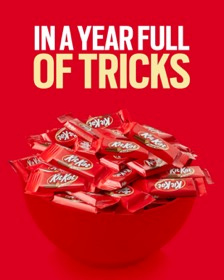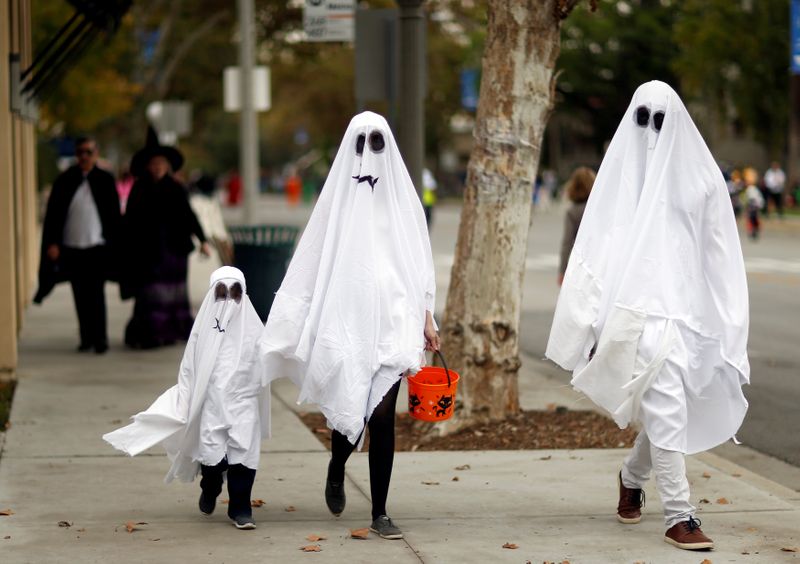By Richa Naidu
CHICAGO (Reuters) - Spooked by COVID-19, Martha Jones of Southern Kentucky will not let her three children trick-or-treat this year. Instead, she is transforming her sun deck into a mini-haunted house and setting up games, a grill and a bonfire in her backyard.
"It'll give the children something to be excited about without going door-to-door for candy," said Jones, a 31-year-old chocolatier.
Hundreds of miles away in the New York City borough of Brooklyn, 43-year-old musician Paul Lee is figuring out how to make sure his two kids can safely go trick-or-treating - the Halloween custom in some countries of children wearing costumes and going from house to house, asking for candy with the phrase "Trick or treat."
In the weeks leading up to the Oct. 31 event, Jones and Lee will see very different ads on social media and websites from candy maker Hershey Co (N:HSY), based on where they live, how likely they are to be on lockdown, and what Halloween activities they have been searching for online. This is part of a new marketing strategy in partnership with Alphabet Inc's (O:GOOGL) Google, Hershey executives told Reuters.
Hershey will tailor digital ads to households using search data provided by Google to overcome fresh challenges that threaten to derail this year’s Halloween.
The Pennsylvania-based candymaker struck a deal with Google last month for access to data showing whether people are more or less likely to go outside based on what they search for. For instance, a person who sought out business hours for nearby stores or vacation ideas suggests the likelihood to go outside.
So Jones and other people staying home for the holiday could see videos and clips on social media of people eating KitKats and Reese's Peanut Butter Cups under twinkly lights in their backyards or living rooms. In places where people are more inclined to venture out, they might see ads of mask-clad kids and adults going door-to-door for candy.
"On a weekly basis, we can change how we're talking to consumers based on what we're seeing geographically," Phil Stanley, Hershey's chief sales officer, said in an interview in August.
The move is one of many strategic changes to marketing and logistics that U.S. candy companies are making ahead of Halloween, after a disappointing Easter.
Halloween is typically the candy industry's biggest holiday season by sales, followed by the periods around Christmas, Easter and Valentine's Day. For Hershey, Halloween represents a tenth of its roughly $8 billion in annual sales.
This year, anticipating a sharp increase in online sales and fewer trick-or-treaters, Hershey, Mondelez International Inc (O:MDLZ) and their rivals are shrinking candy packs, spending more on digital marketing, setting up Halloween store displays earlier in the year, and keeping aside more e-commerce inventory for retailers trying to make up for lost brick-and-mortar sales.
Hershey, which relies on trick-or-treating for about half of its Halloween sales, told Reuters it plans to increase digital media spending on Halloween by 160% versus last year, targeting mainly e-commerce shoppers. Mondelez, which makes Sour Patch Kids chewy candies, said it too plans to spend more this Halloween on social and digital media.
NEIGHBORHOOD WATCH
Only about one-third of U.S. parents plan on sending their kids trick-or-treating this year, according to Matt Voda, CEO of marketing analytics firm OptiMine Software. "So that's the big dilemma for candy companies - how do you overcome that potential shortfall?"
A key part of the industry's marketing strategy is convincing people that going out is no longer an essential part of Halloween.
The message candy makers are pushing is that shoppers should buy candy for Halloween-at-home in the three months leading up to the event. Retailers like Walmart Inc (N:WMT) and Target Corp (N:TGT) reinforced this idea when they started setting up Halloween displays as early as August, a move that has so far driven a 24.8% increase in Hershey's seasonal sales.
The trick is convincing the right people to shop for home celebrations while not alienating others who plan to continue to go door-to-door with their kids.
"We have the ability to tailor our advertising by ZIP Code," said Hershey spokeswoman Allison Kleinfelter, referring to a postal code used by the U.S. Postal Service to designate locations. "Our team can see where there are differences like in cities or large states."
The Google data that Hershey is mining weekly flags which people are more likely to go out and the degree to which local governments are restricting movement in their areas. Hershey said the data - which is completely anonymous, showing only the data points of unnamed users - is used with research from shopper surveys, retailers and municipalities.

"It's impossible to say how much more Hershey is going to be able to sell before Halloween, whether it'll be enough," Wells Fargo (NYSE:WFC) analyst John Baumgartner said. "But will they keep it from being a complete washout? It's possible."
